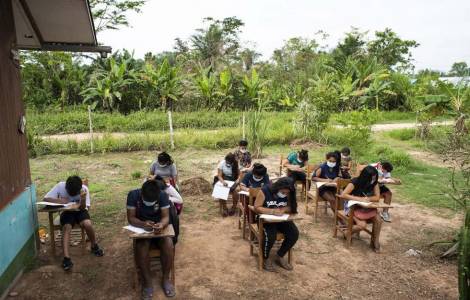
cep
Iquitos (Agenzia Fides) - To enable children and young people from rural and indigenous communities in the provinces of Maynas and Loreto-Nauta to continue attending classes even in isolation due to the pandemic, the Apostolic Vicariate of Iquitos has promoted an initiative to facilitate the access to distance education provided by the Ministry of Public Education through the “Aprendo en Casa” program and by the Loreto Regional Direction of Education through the “Aprendiendo con musica Manguaré” program.
Loreto was one of the first regions to be hit hard by the Covid-19 pandemic and where containment measures have been the most drastic, leaving thousands of schoolchildren who live in remote areas isolated and whose homes do not have the ability to access the Internet, television or radio. Added to this is the announcement made by the Peruvian state, which has extended the possibility of continuing distance education until July 2021. In this context, the Church of Iquitos is currently carrying out the renewal and expansion of the radio station of the Apostolic Vicariate called “La Voz de la selva” with the aim of facilitating the virtual dissemination of the orientation material for the 'Aprendo en Home' and 'Aprendiendo con musica Manguaré' programs for teachers, parents and students from the most remote communities in the region.
In addition, thanks to donations, some 2,500 radio receivers are produced which will be distributed before the start of this year's lessons to families who do not have sufficient financial resources to buy a radio or a television, not to mention that in the worst case scenario they do not even have access to electricity. The goal is to distribute 7,000 such devices before the start of the school year. "Radio receivers will be eco-friendly. In other words they will be made with recyclable material. They will have built-in solar panels and rechargeable batteries which will significantly improve their use. They will not depend on batteries and will be economical and will not contribute to polluting the lands and waters of the Amazonian rivers", explained Mgr. Miguel Fuertes, Diocesan Administrator of the Apostolic Vicariate of Iquitos. The campaign also aims to train 200 teachers, providing them with technical assistance, so that they are able to support families and students.
According to the information provided by the Regional Direction of Education of Loreto, only 52% of the school population of the region has access to distance education services according to its various modalities. The situation has worsened over the past year, with the arrival of the pandemic in this part of the Peruvian Amazon: the economic crisis has been added to the health crisis due to the paralysis of various activities as a result of the quarantine. (CE) (Agenzia Fides, 15/1/2021)